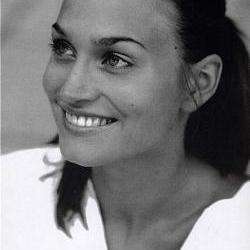Imagine combining sci-fi concepts from A Brave New World, The Revenge of the Body Snatchers, 2001 A Space Odyssey and Star Wars. Now imagine setting that story to music ranging from Strauss’ symphonic poems to jazz to film music to musical theatre to modern opera. Now add a massive cast: a full roster of soloists, dancers, a sizable children’s choir, a full orchestra with all the modern percussion and brass fixings and even a boy soprano dressed like The Little Prince. Deck everyone out with LED lights, build sets that range from enormous paper trees to futuristic structures of steel and cloth and make sure as well to build in expensive video work throughout. Put that all on the largest rotating stage in Europe, have Dennis Russel Davies covering musical direction and don’t forget to simulate – visually and aurally – a live rocket launch to end the first act. Congratulations, you have just created something resembling Moritz Eggert’s operatic creation: Terra Nova oder Das Weiße Leben.
To say that the production was ambitious would be a gross understatement, equivalent to calling Bill Gates “financially stable” or saying that Jeffrey Daumer “had a mild eating disorder which affected his relationships”. At one point nearing the end of the second half, as paparazzi shot video coverage of flag-waving children dressed in orange, blue and white while the population of a small village sang and danced. I found myself completely overwhelmed. Through the haze of white confetti actually falling from the ceiling of the hall, I staggered to my feet, feeling like I had just experienced a very expensive virtual reality science-fiction/music mash-up.
This is exactly what Eggert and his team of librettists, Fronzabel and Rainer Mennicken, wanted to do. Their aim was as ambitious as the corresponding production: get a younger audience into the theatre. A completely noble effort to be wholeheartedly applauded, I can certainly attest that this was the closest I have ever felt to watching a 3D thriller in Dolby Surround Sound whilst at the opera. It was mind-blowing.
The story, in brief, is set on Earth at a time where resources have been exhausted and a totalitarian Ruler (well-cast tenor Jacques le Roux) rules with an iron fist. Protests are led by his ousted ex-wife (outstanding: coloratura soprano Mari Moriya) who has taken on the persona of Chang’e, Chinese goddess of the moon. The Ruler’s current lover, Marilyn (bombshell chanteuse Anaїs Lueken) is a carbon copy of Marilyn Monroe.
One day Pandura (Katerina Hebelkova), an astronaut, discovers a meteorite in Novosibirsk filled with white matter and promising humanity hitherto unknown energy, eternal life and a new paradise on a distant planet, called Eden. She convinces the Ruler to back her project and trains three astronauts, Armstrong (Sven Hjörleifsson), Titov (Michael Wagner) and Dreier (Matthäus Schmidlechner) for the long space journey amidst increasing protests that the matter released is having some unintended side effects. Spoiler alert: it’s aliens. They take over their hosts on a microbiological level from inside out and completely replace them. Pandura comes to terms with it when her love interest, Kolker (the strong Martin Achrainer), also the head of the secret police and brother to Chang’e, is turned and tries to get her infected. What happens to the astronauts in the meantime, you ask? They overuse hallucinogenics during the long journey and lose complete touch with reality. As one does.
Despite the insane plot and minor production irritations (I found the mix of amplified and non-amplified voices distracting), the execution of the production is truly top-notch and highly innovative. Carlos Padrissa's direction is particularly brilliant, especially considering the multitude elements to be juggled. The singing is mostly fabulous, from the soloists through to the choral work of adults (direction, Georg Leopold) as well as children and youth choirs (direction, Ursula Wincor), and the Bruckner Orchestra Linz sounded impressive led by Dennis Russell Davies. The choreography was likewise superb (choreography: Mei Hong Lin). The dancing was engaging, and the technical artistry borderline genius, including stage design (Roland Olbeter and Esterina Zarrillo), costuming (Chu Uroz), and visuals (Valentin Huber).
Even if I would argue that some fat could be trimmed from this extravaganza – nearly three hours of epic everything is a lot to take in – I applaud Linz and this production for daring to think big, create new art forms and productions, and for doing it all with such energy and ambition. Any Viennese operagoers who are wondering if they really need to see a classical production for the fifth time at the Haus am Ring, or need a break from symbolist Regietheater shockfests, should take the short trip to Linz and check out Terra Nova. It is a truly innovative production which must be seen to be believed.


